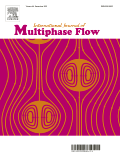
INTERNATIONAL JOURNAL OF MULTIPHASE FLOW
Scope & Guideline
Pioneering Research in Multiphase Flow
Introduction
Aims and Scopes
- Multiphase Flow Dynamics:
The journal emphasizes the dynamics of different multiphase systems, including gas-liquid, liquid-solid, and gas-solid interactions, exploring their complex behaviors and governing equations. - Experimental and Numerical Methods:
It publishes research employing both experimental techniques and numerical simulations, including computational fluid dynamics (CFD), to analyze and predict multiphase flow phenomena. - Phase Change and Heat Transfer:
A significant focus is placed on heat transfer mechanisms and phase change processes within multiphase flows, which are crucial for applications in energy systems and industrial processes. - Modeling and Simulation Techniques:
The journal encourages innovative modeling approaches, including machine learning and advanced numerical methods, to tackle multiphase flow challenges and improve predictive capabilities. - Applications in Engineering and Environmental Science:
Research is often directed towards practical applications of multiphase flow in fields such as chemical engineering, environmental engineering, and energy systems, including renewable energy technologies.
Trending and Emerging
- Machine Learning and AI in Multiphase Flow:
There is an increasing trend in the application of machine learning and artificial intelligence techniques to analyze and model multiphase flows, enhancing predictive accuracy and efficiency. - Microfluidics and Nanoscale Studies:
Research in microfluidics and nanoscale multiphase systems is gaining traction, driven by advancements in technology and the demand for precise control in applications such as drug delivery and materials science. - Sustainability and Environmental Impact:
Emerging themes include the study of multiphase flows in relation to sustainability, such as the effects of multiphase interactions in environmental contexts and renewable energy systems. - Complex Interfacial Phenomena:
There is a growing interest in understanding complex interfacial dynamics and their effects on multiphase flow behavior, particularly in the context of enhanced heat transfer and mass transfer applications. - High-Performance Computing and Advanced Simulations:
The use of high-performance computing for advanced simulations of multiphase flows is trending, allowing for more detailed and accurate modeling of complex systems.
Declining or Waning
- Basic Theoretical Studies:
There appears to be a waning interest in purely theoretical studies of multiphase flow without substantial experimental or practical applications, as the focus shifts towards more applied research. - Simplistic Models of Multiphase Interactions:
There has been a reduction in the publication of simplistic models that do not incorporate the complexities of real-world interactions, as researchers are now favoring more sophisticated and realistic modeling approaches. - Single Phase Flow Studies:
Research focused solely on single-phase flow phenomena has decreased, as the integration of multiphase interactions becomes more relevant in practical applications.
Similar Journals

Transactions of the Korean Society of Mechanical Engineers B
Elevating the discourse in mechanical engineering research.Welcome to the Transactions of the Korean Society of Mechanical Engineers B, a pivotal journal dedicated to advancing the field of mechanical engineering. Published by the esteemed Korean Society of Mechanical Engineers, this journal serves as a platform for the dissemination of innovative research and practical applications in mechanical engineering and related disciplines. With a focus on fostering knowledge exchange and collaboration, the journal publishes original research articles, reviews, and technical notes that contribute to the understanding and evolution of mechanical systems and technologies. The Transactions of the Korean Society of Mechanical Engineers B, which has been in circulation since 2007 and spans through 2024, is categorized within the Q4 quartile of mechanical engineering rankings and is indexed by Scopus, making it a valuable resource for researchers and professionals aiming to stay abreast of the latest developments in the field. Although it is not open access, its rigorous peer-review process ensures the integrity and quality of the published work, making it essential reading for academics and practitioners alike.

Interfacial Phenomena and Heat Transfer
Exploring the Dynamics of Heat Transfer and InterfacesInterfacial Phenomena and Heat Transfer is a leading academic journal published by BEGELL HOUSE INC that has rapidly established itself as an essential resource for scholars and industry experts in the fields of engineering, fluid flow, and chemical processes. With an ISSN of 2169-2785 and E-ISSN 2167-857X, this journal focuses on the critical interdisciplinary aspects of heat transfer and interfacial phenomena, offering insights that span across mechanical engineering, chemical engineering, and physical sciences. Despite its relatively recent inception in 2017, it has garnered respectable recognition, with a 2023 Scopus rank placing it in the Q3 category within the disciplines of Engineering (miscellaneous) and Fluid Flow and Transfer Processes, making it a pertinent publication for those interested in cutting-edge research. As researchers and professionals navigate the complexities of interfacial dynamics, Interfacial Phenomena and Heat Transfer serves as a pivotal platform, publishing high-quality, peer-reviewed articles that aim to advance knowledge and stimulate further investigation in this increasingly vital domain.

Experimental and Computational Multiphase Flow
Elevating Standards in Fluid Flow and Transfer ProcessesExperimental and Computational Multiphase Flow, published by SpringerNature, is a prestigious academic journal that critically examines advancements in the field of fluid dynamics, with a specialized focus on multiphase flow phenomena. Since its inception in 2019, the journal has established a remarkable reputation, attaining Q1 status in Fluid Flow and Transfer Processes as well as Mechanical Engineering according to the 2023 category quartiles, reflecting its high impact and relevance in these domains. With Scopus rankings placing it among the top 15 journals in both Chemical Engineering and Nuclear Energy and Engineering, Experimental and Computational Multiphase Flow is an essential resource for researchers, professionals, and students engaged in cutting-edge studies and applications. Although it operates on a subscription model, the journal remains dedicated to disseminating high-quality research and fostering a deeper understanding of complex fluid interactions across various scientific disciplines. By prioritizing innovative methodologies and interdisciplinary collaborations, the journal aims to significantly contribute to the ongoing evolution of multiphase flow research, recognizing its critical importance in engineering and energy sectors.

ASME Journal of Heat and Mass Transfer
Fostering Collaboration in Thermal SciencesASME Journal of Heat and Mass Transfer, published by the renowned American Society of Mechanical Engineers (ASME), is a pivotal journal in the fields of mechanical engineering and materials science. With its ISSN 2832-8450 and E-ISSN 2832-8469, this journal aims to disseminate high-quality research focused on the principles and applications of heat transfer and mass transfer phenomena. Despite its recent launch, having converged from 2023 to 2024, it has quickly established a significant presence in the academic community, holding respectable rankings within the Scopus database across various categories—including a 66th percentile rank in Mechanical Engineering. The journal endeavors to foster innovation and collaborative research that advance the frontiers of knowledge in thermal sciences, making it an essential resource for researchers, practitioners, and students keen on exploring the challenges and developments in heat and mass transfer technologies. The journal also embraces an open-access model, ensuring that leading research reaches a broader audience and contributes to global knowledge sharing.
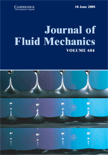
JOURNAL OF FLUID MECHANICS
Pioneering research in the realm of fluid mechanics.JOURNAL OF FLUID MECHANICS, published by Cambridge University Press, is a premier international journal recognized for its significant contributions to the field of fluid dynamics. With an esteemed impact factor that places it in the Q1 category across multiple disciplines, including Applied Mathematics, Condensed Matter Physics, Mechanical Engineering, and Mechanics of Materials, this journal serves as a vital resource for researchers and practitioners alike. Established in 1956, it provides a platform for innovative and high-quality research articles that advance the understanding of fluid mechanics phenomena. The journal's rankings underscore its prestige, with Scopus recognizing it among the top journals in its category. Although it currently does not offer open access, the journal remains accessible to educational institutions and professionals in the United Kingdom and beyond. By addressing critical and emerging topics in fluid mechanics, JOURNAL OF FLUID MECHANICS is essential for those striving to push the boundaries of knowledge and application in this dynamic field.

Thermophysics and Aeromechanics
Navigating the Complexities of Energy and AerospaceThermophysics and Aeromechanics, published by PLEIADES PUBLISHING INC, is an esteemed journal dedicated to advancing the fields of aerospace engineering, energy engineering, modeling and simulation, as well as nuclear and high energy physics. With an ISSN of 0869-8643 and E-ISSN 1531-8699, this journal serves as a vital platform for researchers and professionals working at the intersection of thermophysics and aeromechanics, delivering cutting-edge research, reviews, and case studies. Despite its current position in Quartile Q4 across multiple categories, including aerospace and energy engineering, it provides a unique opportunity for emerging ideas in these domains to gain visibility and impact. The journal's convergence of diverse scientific disciplines is critical for fostering innovation and technological advancements, making it an essential resource for students, practitioners, and academics alike. In this era of rapid scientific development, Thermophysics and Aeromechanics plays a pivotal role in disseminating knowledge and facilitating interdisciplinary collaboration among a global audience.
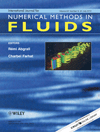
INTERNATIONAL JOURNAL FOR NUMERICAL METHODS IN FLUIDS
Advancing the Frontiers of Fluid Dynamics ResearchINTERNATIONAL JOURNAL FOR NUMERICAL METHODS IN FLUIDS, published by Wiley, has established itself as a leading platform for cutting-edge research in the fields of applied mathematics, computational mechanics, computer science applications, and mechanical engineering. With its ISSN 0271-2091 and E-ISSN 1097-0363, this journal is committed to disseminating high-quality, peer-reviewed articles that contribute to the advancement of numerical methodologies in fluid dynamics. Boasting a commendable 2023 impact factor that places it in the second quartile across multiple relevant categories, it provides insights into significant research dimensions that engage an audience of researchers, professionals, and students keen on the computational challenges of fluid flow. The journal's broad scope encompasses foundational and applied research, encouraging the exploration of new numerical techniques and algorithms. As an invaluable resource based in the United Kingdom, INTERNATIONAL JOURNAL FOR NUMERICAL METHODS IN FLUIDS remains dedicated to providing insights and fostering innovation in its domain, with a consistent publication history spanning from 1981 to 2024.

HEAT TRANSFER RESEARCH
Fostering Excellence in Heat Transfer ResearchHEAT TRANSFER RESEARCH is a leading academic journal published by Begell House Inc that focuses on the dynamic and evolving fields of heat transfer, fluid flow, and mechanical engineering. With an ISSN of 1064-2285 and an E-ISSN of 2162-6561, this journal serves as a critical platform for researchers and professionals seeking to disseminate innovative findings and advancements in these interrelated disciplines. Covering converged years from 1992 to 2024, HEAT TRANSFER RESEARCH has established its impact in the academic community, achieving a 2023 ranking of Q3 in Condensed Matter Physics and Q2 in Fluid Flow and Transfer Processes. It currently occupies a percentile rank ranging from 44th to 54th across several Scopus categories, underscoring its relevance and contribution to the scientific discourse. While Open Access options are not available, the journal remains committed to providing high-quality research and insights that shape the future of thermal sciences. Accessible to both seasoned professionals and aspiring students, HEAT TRANSFER RESEARCH is indispensable for anyone looking to stay ahead in the ever-changing landscape of engineering and applied physics.
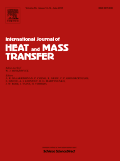
INTERNATIONAL JOURNAL OF HEAT AND MASS TRANSFER
Pioneering Discoveries in Condensed Matter PhysicsINTERNATIONAL JOURNAL OF HEAT AND MASS TRANSFER is a premier, peer-reviewed academic journal published by PERGAMON-ELSEVIER SCIENCE LTD, focusing on the vital fields of condensed matter physics, fluid flow, and transfer processes, as well as mechanical engineering. With an impressive impact factor and consistently ranked in the Q1 quartile across multiple engineering and physics categories, this journal stands out for its rigorous scholarship and relevance to advancements in heat and mass transfer phenomena. Spanning from 1960 to 2024, it serves as a critical platform for researchers and professionals aiming to disseminate innovative findings and foster cutting-edge discussions in these interconnected domains. Though it operates on a subscription model, readers benefit from a comprehensive archive that covers seminal studies and contemporary advancements. Academics and practitioners alike can deepen their understanding of the complex interplay between heat and mass transfer, which is essential for numerous applications in engineering and scientific research.
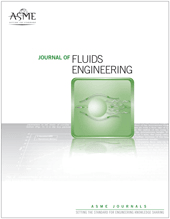
JOURNAL OF FLUIDS ENGINEERING-TRANSACTIONS OF THE ASME
Unveiling Insights in Thermal and HydrodynamicsJOURNAL OF FLUIDS ENGINEERING-TRANSACTIONS OF THE ASME, published by the renowned American Society of Mechanical Engineers (ASME), stands as a pivotal platform for disseminating cutting-edge research in the field of mechanical engineering, specifically focusing on fluid mechanics and its diverse applications. With an established history dating back to 1897, this journal features research that pushes the boundaries of knowledge and technology in areas such as fluid dynamics, thermal engineering, and hydrodynamics. Although it is not an open-access journal, it maintains rigorous peer-review standards, ensuring the publication of high-quality scholarly articles that contribute to the academic and professional community. In the latest rankings, it holds a respectable position within the Q2 category of mechanical engineering journals, reflecting its significant impact, as evidenced by its Scopus rank of #204 out of 672, placing it in the 69th percentile. Researchers, professionals, and students alike will find this journal to be a vital resource for the latest developments and innovative insights in fluids engineering.